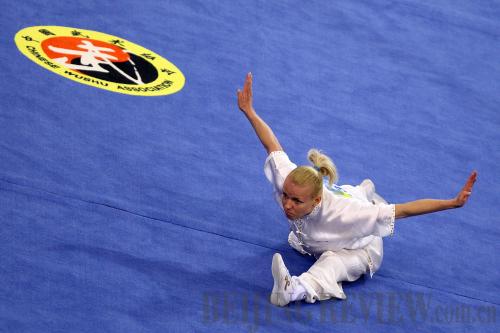|
 |
|
AGILE FIGHTER: Daria Tarasova from Russia competes in women's changquan on day one of the SportAccord Combat Games 2010 on August 28 in Beijing (CFP) |
Russian Tatiana Ivshina grabbed a gold with her fierce fists and glistening knife, in the nanquan (southern fist) and nandao (southern knife) event on August 28. Lindswell, an Indonesia girl pocketed a gold in taijiquan and Iranian athlete Farshad Arabi won the gold in men's nanquan and nangun (southern stick) event.
Athletes from Chinese mainland, Macao and Hong Kong took seven, two and one out of the total of 13 gold medals of wushu events, respectively.
Overseas dissemination
Kungfu movies have made Chinese martial arts popular outside China. Their popularity exploded as Bruce Lee became an international star in the 1970s, according to the United States of America Wushu Kungfu Federation (USAWKF), the official United States representative to the International Wushu Federation (IWUF).
Wushu was first brought to the United States during the California Gold Rush in the 1850s and 1860s. It was kept secret within the Chinese community until in the 1960s, when the community gradually opened it up to non-Chinese. In the 1970s, Bruce Lee brought kungfu onto the big screen, and to mainstream American and international audiences. In the 1980s and 1990s, martial arts developed vigorously in the United States with the arrival of more martial artists from Chinese mainland, Hong Kong, Taiwan and Southeast Asia. Many of them opened martial arts schools.
Chan and Li came to Hollywood and wowed audiences with their great martial art stunts and performances. Chan continued his success in Hollywood with Shanghai Noon in 2000 and a number of other hit movies.
Before going into movies, Li was a national wushu champion in China. The 1982 film, Shaolin Temple, swiftly turned him into a hot movie star. He further proved his acting talent with the Once Upon a Time in China series. He later went to Hollywood and starred in popular kungfu movies such as Romeo Must Die in 2000 and The Forbidden Kingdom in 2008.
Kungfu movies have increased foreign audiences' understanding of Chinese martial arts, and kindled their interest in practicing kungfu.
Kungfu movie Ip Man (2008) and its two sequels, which are loosely based on the story of Bruce Lee's teacher, sparked a new surge of interest in Chinese martial arts. Some fans enrolled in local wushu schools to study.
IWUF has further promoted the spread of wushu worldwide. Its schedule is crowded with world or regional wushu competitions.
Currently, IWUF has member federations in 135 countries and regions, with 30 in Africa, 21 in America, 38 in Asia, 42 in Europe and four in Oceania. In 1994, it was accepted as an official member of GAISF, the predecessor of SportAccord.
IWUF's member federations organize and host wushu competitions and contribute to worldwide development of the sport.
The USAWKF, IWUF's member federation in the United States, has created a national network of martial artists, schools, coaches and athletes dedicated to supporting kungfu. This network provides information, training and promotion for members and others interested in martial arts. On its website, there is a list of nearly 200 kungfu schools in the United States, Canada and Mexico.
An Olympic dream
Although wushu has become more popular overseas, it has not yet been included in the Olympic Games. During the past decade, the IWUF has been working to achieve this goal.
Wushu became a competitive medal event at the Asian Games in 1990 when Beijing was the host, yet when Beijing hosted the Olympic Games in 2008, wushu made no appearance at the games. Instead, Wushu Tournament Beijing 2008 was held on the sideline of the Beijing Olympic Games. The wushu tournament was participated in by a total of 128 athletes from 43 countries and regions.
During the recent SportAccord Combat Games 2010, several wushu champions said their dream is to compete at the Olympic Games. In an interview with The Beijing News, Chan said that including Chinese martial arts in Olympics would promote Chinese culture. But he said he thought that the diversity of wushu styles and schools was an obstacle to wushu becoming an Olympic sport.
Li said that taijiquan has about 150 million practitioners all over the world, and its popularity should enable it to qualify as an Olympic sport. Because of taijiquan's simple philosophy and benefit to physical fitness, he expected that it could knock open the Olympic door in 10 to 20 years.
Wang Xiaolin, Secretary General of IWUF, said for wushu to be popular internationally, it should not be too complicated so that foreigners could easily understand it. He said the event design and competition rules should be reformed. | 